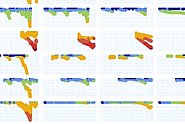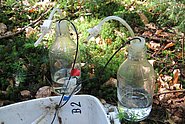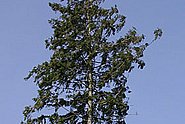
Long-term Forest Ecosystem Research ¶
Air pollution and climate change have an effect on the forest. We examine these effects as part of the Long-Term Forest Ecosystem Research (LWF) programme.
Assess forest condition ¶

We need reliable information in order to assess the condition of forests on an ongoing basis and to understand precisely what happens in forests when the environment changes. An important source of data here is the Long-Term Forest Ecosystem Research (LWF) programme. It consists of 19 permanent monitoring sites on which we have regularly carried out numerous measurements since 1994. We have also been recording the health of trees on the monitoring sites of the Sanasilva Inventory, which is part of the LWF programme (see Sites), since 1985. LWF is also a partner with several of its sites in TreeNet, the biological drought and growth indicator network.




